- Home
- Alex Scarrow
Time Riders tr-1 Page 10
Time Riders tr-1 Read online
Page 10
Foster’s voice carried a little further across the grand hall than perhaps he’dintended, but since no one else here seemed to speak English Maddy thought it probablydidn’t matter too much.
‘So, this afternoon, I want you to explore the museum. To reach out and really feel the history you’re defending. I’ll leave you to makeyour own way around and then we’ll meet back here in the entrance hall at fivesharp.’
They nodded in silence.
‘Then I’m taking you guys out to the best ribs and burger place I know. Acelebration… Think of it as a sort of graduation party.’
Liam found the display of dinosaurs breathtaking and was unable to tear himselfaway from the giant skeletons and the animatronic dioramas. He was soon left alone as thegirls and Bob wandered off to view the other exhibits.
Before he knew it, several hours had passed and he decided to make his way back to theentrance hall to await the others.
He watched the busy area, full of snapping cameras and quietly whispered familyconversations, overexcited children and mewling babies. Not for the first time, he felt a warmglow of gratitude to Foster for plucking him from the bowels of the stricken Titanic, saving him from the worst possible death he couldimagine.
In the last dozen or so days — he’d lost track of how long they’d been here- he realized he was the luckiest person born in the nineteenthcentury for the things he’d been privileged to see almost a hundred years intohis future, and all the amazing things he was yet to see. Hegrinned like a fool, like a child promised every Christmas present he could wish for.
His gaze drifted across to a milling crowd beside the large entrance doors. People seemed tobe hesitating there on their way out. Curious, he crossed the hall.
On a podium, a large leather-bound book lay open beneath the glow of a brass reading lamp.Beside it an old security guard with a ruddy face, topped with thick bushy eyebrows and an oddheart-shaped mole poking out from one of them, stood to attention.
‘Guest book,’ growled the guard, noticing Liam’s curious gaze. ‘Feel free to sign and add a comment if you wish, sir,’ he addedreluctantly. ‘And keep it clean.’
Liam looked down and noticed the scrawled messages of hundreds of visitors, so many differentnames, so many languages.
‘Keep it clean?’
The guard cleared his throat. ‘I know what you damn teenagers are like.’
Liam felt a tap on his shoulder and turned round. It was Maddy.
‘Guest book,’ said Liam.
‘Oh yeah… I know. I came here on a school trip once and left a dirty poem,’she giggled.
The guard scowled disapprovingly, his bushy old eyebrows knotted together, as if he actuallyrecalled the very words she’d written.
‘You still archive them?’ Maddy asked the guard.
‘We do,’ he replied stiffly. ‘We keep every guest book, down in thebasement. We’ve done that since before the beginning of the last century. A hundredyears of comments,’ he said proudly. ‘Not all of them dirtypoems, neither.’
Maddy cringed guiltily. ‘Sorry.’
But the guard was already busy directing a visitor to where the toilets were.
‘Go on, Liam. Why don’t you sign it?’
He looked at her. ‘Uh… will I not change history, or something?’
‘I can’t see how you would.’
He gingerly picked up the pen, attached by a chain to the podium.
Liam O’Connor, 10 September 2001 — I loved the dinosaurs alot.
‘That it?’ asked Maddy.
He shrugged. ‘Don’t want to push me luck now.’
She shook her head and snorted. ‘Ah… there are theothers.’
Liam followed her across the hall, casting one last glance back at the book.
There, I left me mark on history.
If he died tomorrow for whatever reason, at least there’d be a scribbled line on a pageof a book somewhere that showed he’d once existed.
‘Well done,’ said Foster, clinking his glass tankard of beer againstLiam’s, and Maddy’s and Sal’s glasses of Dr Pepper.
Bob observed the ritual with a curious expression on his face, picking up an empty glass andtapping it against another.
‘You all did very well,’ added Foster, before slurping a large frothy mouthful ofice-cold beer. He wiped his lips and, cautiously glancing around at the busy restaurant, helowered his voice. ‘You’ve all seen how it works now. You all understand the partyou have to play in the team?’
Maddy and Sal nodded.
Liam shrugged. ‘But I didn’t actually do very much, Mr Foster.’
‘No… not this time. But you will. The agency uses the Kennedy incident as astandard training mission. It’s a little piece of history that corrects itself. But whenyou go back on a proper mission it’ll be down to you and ofcourse the support unit — ’ he looked across at Bob, studiously examining a steakknife — ‘to make things right.’
‘But how will I know what to do?’
‘You’ll know, Liam. Because you’re a very bright young man, quick on yourfeet.’ Foster placed a fatherly hand on his shoulder. ‘Initiative…that’s what you’ve got. You’re a smart lad. No amount of training can give aperson that.’
‘Uh… thanks.’
‘What do you think, Bob?’
The clone looked up from the steak knife. ‘Mission Operative Liam O’Connoris… good.’
‘There. I think he likes you.’
Liam smiled. ‘Thanks, Bob.’
Foster turned to Maddy and Sal. ‘And you two… you did very well.’
They grinned, both very pleased with themselves.
‘But this exercise is just the beginning.’
A waitress arrived with a tray full of plates. She prepared to deal them out like playingcards. ‘Who’s havin’ the rack of ribs?’
Liam raised a hand. ‘I’m starving,’ he said.
‘The salad?’
Sal raised her hand.
‘The burgers?’
Foster and Maddy nodded.
The waitress looked at Bob, confused. ‘I’m sorry, sir. What did youorder?’
Bob glanced up at her with his piercing grey eyes. ‘I do not eat human food unless itis a necessary mission requirement,’ he explained dryly.
The waitress cocked her head. ‘Excuse me?’
‘Oh, don’t worry about him,’ said Foster. ‘He’s just notallowed to eat on duty.’
She smiled coyly at Bob, admiring his physique. ‘So… are you, like, some kind ofundercover cop, then?’
Bob turned to Liam. ‘Liam O’Connor, explain the term “cop”,please.’
Liam shrugged and made a face. ‘You’re asking me?’
‘A “cop”,’ explained Foster, ‘is a slang term for alaw-enforcement officer.’
‘I understand.’ Bob nodded slowly and closed his eyes. ‘Iam filing the term for future use.’
The waitress looked from Bob to Foster, bemused.
‘You guys ain’t from around here, are you?’
Maddy finished chewing her first mouthful of burger. ‘Oh, you can forget about them- they’re Canadian.’
CHAPTER 30
1941, Berghof — Hitler’s winter retreat
Kramer cowered behind a small oak bureau in the hallway. Shards of wood stung hisface as a dozen rounds slammed into the far side and sharp slithers splintered off.
He rattled a stream of curses out under his breath as the corridor filled with the deafeningcrack of machine-gun fire.
At the end of the hallway several SS Leibstandarte were dug into covered positions, defendingthe double doors to die Gro?eHalle, the main room of Hitler’s mountain retreat.
Karl and several of his men returned fire, their shots peppering the overturned marble tableahead of them behind which the SS were putting up a valiant defence. Showers of powderedmarble erupted from the once mirror-smooth table surface, now pockmarked with cracks andbullet craters.
‘We have to move, Karl! Th
ey’ll have reinforcements here any second!’
Karl nodded. He understood the situation all too well.
The attack had started out smoothly. He and his men had quietly slipped past the machine-gunposts either side of the winding road and made their way up the steep rise towardsHitler’s hillside chalet. But the game was up when a guard spotted them at the lastmoment approaching the building’s main entrance. He’d managed to fire off a singleshot from his gun before Dieter had slipped a blade into his throat.
Hitler’s hand-picked guards had been surprisingly swift to react,bustling their leader to safety behind the thick double doors of the main hall and setting upa defensive position outside it. The rest of the SS guard detachment in the building had beenquickly and ruthlessly picked off by Karl’s men.
It was just these stubborn guards at the end of the hall now. The problem was, though, thattheir attack had been stalled right here and time was rapidly working against them. Outsidethe chalet a distant klaxon was sounding and the regiment garrisoned nearby was undoubtedlyalready scrambling into their boots and on their way over.
Karl’s five-man rearguard covering the front entrance of the chalet had as much chanceof holding their position as they’d had holding the ground floor of the museum — they were certain to be quickly overwhelmed.
Kramer was no soldier, but he could see that this last hurdle could be the one that finishedthem. If they remained in this stalemate a minute or two longer, then it was going to be allover. The numbers were quickly going to mount against them, and having modern pulse rifles andelite training wasn’t going to make a blind bit of difference.
We’re going to die if we don’t take those men.
He looked across the hallway to where Karl was crouched. Their eyes met. The man nodded,knowing what Kramer was thinking. A faint smile slipped across his face as he slapped in afresh cartridge and racked his pulse rifle ready for action.
The other men around Karl took his lead, quickly reloading their weapons and then readyingthemselves to burst out into the open and sprint the length of the hallway under fire.
Silently Karl mouthed a countdown, turning back to his men, encouraging them with a finaldevil-may-care grin that told the mercenaries they were going to succeed or die heroes.
Five… four… three… two… one…
They emerged from their covered positions as one, laying down a withering barrage ofrapid-fire high-impact shots that filled the air around the table with a blizzard of chippedfragments and marble powder.
They ran forward, still firing, ten yards… five yards…
Kramer followed in their wake. He found himself screaming like a banshee.
Karl was the first to reach the overturned table, crashing heavily into it. He swiftly pokedhis rifle over the top and sprayed the SS guards sheltering behind it point blank with asustained burst until his pulse rifle clacked like a woodpecker, exhausted of ammo.
Rudy and Sven joined him, emptying their clips blindly over the top of the table into thespace behind it.
Then all of a sudden it was as silent as a graveyard.
The smoke and dust cleared around them and Kramer, gingerly lifting his head to look over thetop, saw the men dead on the floor, an unpleasant mash of flayed flesh, splintered bone andtattered black ceremonial uniforms.
In the distance, muted through the thick stone walls of the chalet, he could hear the rapidtap of gunfire from the front of the building.
The garrison’s here already.We’re out of time.
Karl clambered over the table and aimed a swift, hard kick at the oakwood double doors. Theyrattled heavily and swung inwards.
Karl led the way in.
As he stepped through, a single pistol shot echoed across the grand room and a solitary shardof wood flung off the oak door beside his head.
Rudy, stepping in beside him, swung his weapon round and emptied half adozen shots into a portly looking Wehrmacht general with braids on his shoulders, throwing himback across a grand banqueting table covered with maps and scattered typed pages ofintelligence notes and field deployments. The general rolled off the side of the table andthudded heavily on to the floor.
Kramer stepped into the room, slowly scanning the sweat-soaked faces cowering behindarmchairs and coffee tables. Generals and field marshals — so much gold braiding, somany medals pinned to their chests — and yet here they were looking very much like aclass of startled children. His eyes finally rested on a trembling man in a tan-coloured tunicwith a dark fringe drooping over one eye, and his distinct toothbrush moustache.
Unmistakably… it was the very man they were after.
Hitler was crouching on the floor holding an ineffective-looking pistol in his shaking hand.As the sound of the distant gunfight around the Berghof’s entrance grew more insistent,Kramer took a step forward.
‘Adolf Hitler,’ he said in fluent German, ‘your plans to attack Russia inthe next few weeks will result in you losing this war.’
Hitler’s eyes widened, his lips flickered and tensed, but he said nothing.
‘Now, if you want to win this war, if you want detailed intelligence of what yourenemies are doing right now, if you want weapons technology that will make you invincible-’ he nodded back down the hallway, at the growing cacophony of approachinggunfire — ‘then I suggest you call off those men outside and listen very closely to what I have to tell you.’
CHAPTER 31
2001, New York
Maddy walked alongside Foster as they crossed the Williamsburg Bridge back over theHudson River to Brooklyn. In the darkness, the lights of the city danced on the watermagically.
‘It really is a beautiful city,’ she said.
Foster nodded. ‘Tonight is special,’ he said. ‘I always think of thisevening as the last one of the “old” New York. Tomorrow, when those two planesarrive, it’ll change.’
They walked in silence for a while, watching the others ahead. Sal and Liam seemed to beteasing Bob, laughing at the stiff, unnatural way he talked. There’s no harm in that,she supposed. Bob needed to sound a lot more like a human if he was going to blend in,particularly if he was going to be sent alongside Liam on assignments back into the past.
She noticed the old man was looking a little frailer than he had when he’d pulled herout of that plane. He rarely seemed to sleep. Almost every night, after they’d alltucked themselves up into their cots, she heard the archway’s door creak open.
‘Where do you go at night?’
He looked at her.
She shrugged. ‘I hear you sneaking out.’
‘I walk around Brooklyn.’ He smiled. ‘I clear my head. The fresh air doesme some good.’
She studied him silently for a moment. ‘Are you OK, Foster?’she asked.
Foster took his time replying. ‘You’ve noticed, then?’ he saideventually.
‘I’m not sure what you mean.’
‘That I’m dying,’ he said quietly.
‘What?’
He looked at her. ‘I figured you would’ve worked it out soon enough.’
‘Actually, I was just thinking you weren’t looking too well… that’sall.’
He smiled again. ‘That’s kind of you. But, in fact, I’m dying… veryquickly as it happens.’
‘What’s… what’s wrong? Do you need a doctor?’
‘No, it wouldn’t help,’ he said, shaking his head. ‘This is somethingyou need to know, Maddy,’ he said, grasping her forearm.‘You can’t tell the others right now. Particularly not Liam.’
‘What?’
Foster took a deep breath. ‘It kills you, eventually.’
‘What does?’
‘Timeriding,’ he replied, ‘going into the past. It only has a gradualeffect at first — so gradual he won’t notice to begin with. But the more he doesit, the further back he goes, the greater the harm he’ll be doing to his body. Theprocess will gradually corrupt the cells in his body, prematurely ageing him.’
She looked at him, alarmed.
/>
‘Yes… ageing him. At first it won’t beapparent. But towards the end, when the corruption has reached a certain level, he willsuddenly age fast.’
A thought occurred to her — a question she didn’t want to ask, but knew she hadto. ‘So, Foster, could I ask you — ?’
‘You want to know how old I really am?’
She nodded.
He shook his head sadly and she thought she saw the glisten of a tear nestling in the deepwrinkled fold beneath one eye.
‘I was pretty young when I made my first trip.’
‘And now?’
‘If I add up all the Mondays and Tuesdays I’ve served in that fieldoffice,’ he said, running a hand through his fine snow-white hair, ‘I supposeI’d be about twenty-seven now.’
Maddy covered her gasp with a hand. ‘Oh God…’
He managed a wry smile. ‘About ten years older than you. Although inside I still feelyoung, I’ve become an old man,’ he said, his voice tapering off with the sound ofregret, even bitterness in there somewhere. ‘He can’t know, Maddy,’ headded. ‘Not yet… He’s not ready.’
‘But it’s unfair that he doesn’t know what this is doing to hisbody!’
Foster raised a finger to his lips. Even above the noise of traffic rumbling past them overthe busy bridge, her voice might just carry enough for him to hear.
‘He has no choice, Madelaine. Either he does this or he has to return to the Titanic. At least this way he gets another seven or eight years oflife.’
‘What if he left? What if he decided to walk away right now, and never cameback?’
‘He can’t do that. It would cause problems.’
‘This seems…’ She felt her voice thicken. ‘This seems sounfair.’
He shrugged sadly. ‘Life is unfair. You make the best of what life deals you, Maddy. InLiam’s case, he’s been given a few more years of life that he wouldn’t havehad otherwise. And think of all the incredible things he’s going to see in those years.What about all the incredible things he’s seen already? He’s ayoung man who was born in 1896, and yet just now he’s enjoyed a cheeseburger, fries andan ice-cold soda whilst gazing out on twenty-first century New York. What do you think JulesVerne or H. G. Wells would have given to trade places with Liam? Just for five minutes? Justfor a glimpse of this world?’

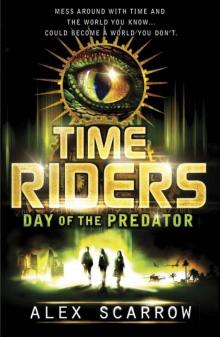 Day of the Predator
Day of the Predator Ellie Quin Book 3: Beneath the Neon Sky
Ellie Quin Book 3: Beneath the Neon Sky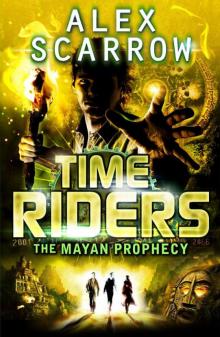 The Mayan Prophecy
The Mayan Prophecy October Skies
October Skies Ellie Quin Episode 4: Ellie Quin in WonderLand (The Ellie Quin Series)
Ellie Quin Episode 4: Ellie Quin in WonderLand (The Ellie Quin Series)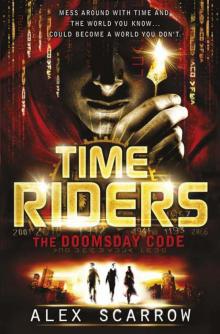 Time Riders
Time Riders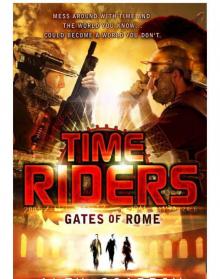 Gates of Rome
Gates of Rome Reborn
Reborn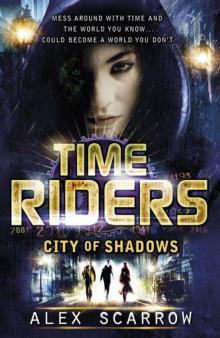 City of Shadows
City of Shadows Ellie Quin Book 2: The World According to Ellie Quin (The Ellie Quin Series)
Ellie Quin Book 2: The World According to Ellie Quin (The Ellie Quin Series) Ellie Quin Episode 5: A Girl Reborn
Ellie Quin Episode 5: A Girl Reborn Spore
Spore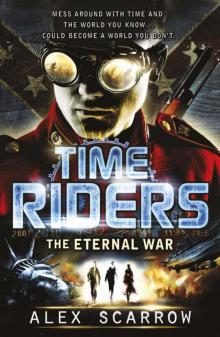 The Eternal War
The Eternal War Last Light
Last Light Remade
Remade Ellie Quin Book 2: The World According to Ellie Quin
Ellie Quin Book 2: The World According to Ellie Quin Ellie Quin Book 3: Beneath the Neon Sky (The Ellie Quin Series)
Ellie Quin Book 3: Beneath the Neon Sky (The Ellie Quin Series)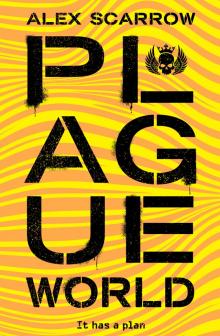 Plague World
Plague World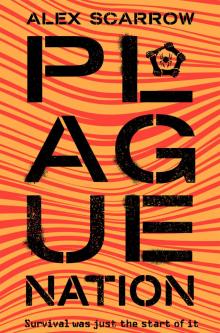 Plague Nation
Plague Nation Ellie Quin Book 01: The Legend of Ellie Quin
Ellie Quin Book 01: The Legend of Ellie Quin Ellie Quin - 04 - Ellie Quin in WonderLand
Ellie Quin - 04 - Ellie Quin in WonderLand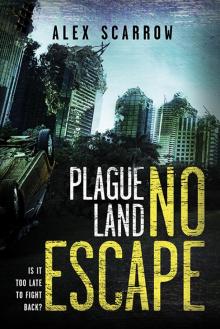 No Escape
No Escape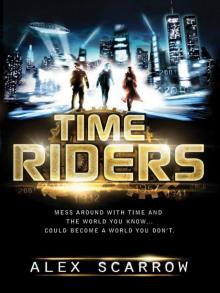 TimeRiders
TimeRiders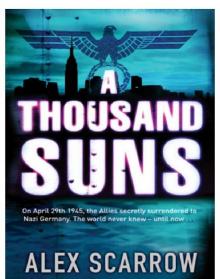 A Thousand Suns
A Thousand Suns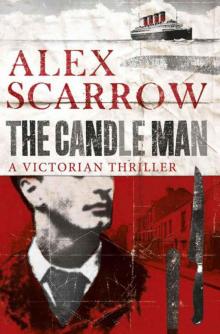 The Candle Man
The Candle Man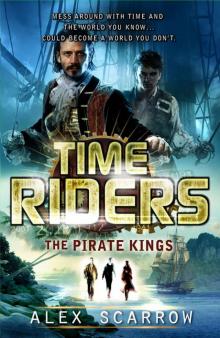 The Pirate Kings
The Pirate Kings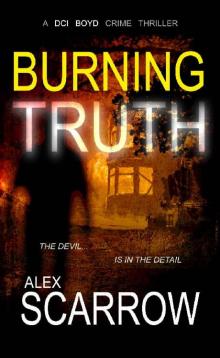 Burning Truth: An Edge-0f-The-Seat British Crime Thriller (DCI BOYD CRIME THRILLERS Book3) (DCI BOYD CRIME SERIES)
Burning Truth: An Edge-0f-The-Seat British Crime Thriller (DCI BOYD CRIME THRILLERS Book3) (DCI BOYD CRIME SERIES)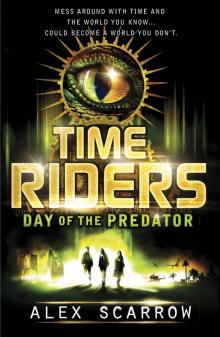 Day of the Predator tr-2
Day of the Predator tr-2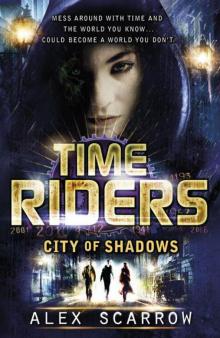 City of Shadows tr-6
City of Shadows tr-6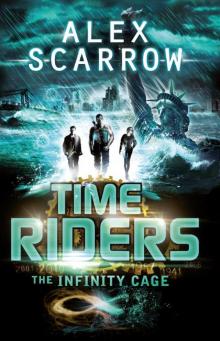 TimeRiders: The Infinity Cage (book 9)
TimeRiders: The Infinity Cage (book 9)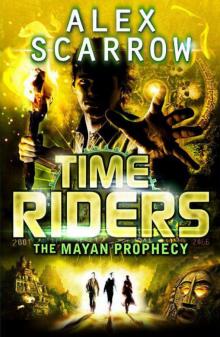 The mayan prophecy (Timeriders # 8)
The mayan prophecy (Timeriders # 8)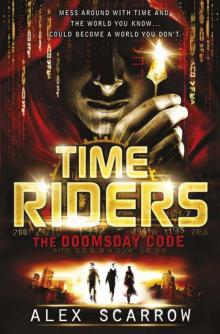 TimeRiders: The Doomsday Code (Book 3)
TimeRiders: The Doomsday Code (Book 3)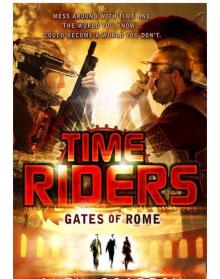 Gates of Rome tr-5
Gates of Rome tr-5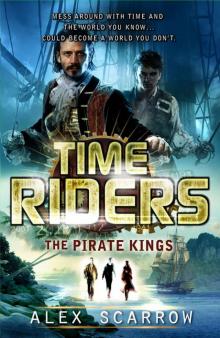 TimeRiders: The Pirate Kings (Book 7)
TimeRiders: The Pirate Kings (Book 7)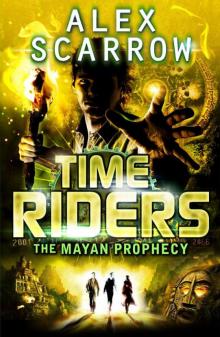 TimeRiders: The Mayan Prophecy (Book 8)
TimeRiders: The Mayan Prophecy (Book 8)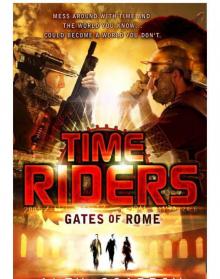 TimeRiders 05 - Gates of Rome
TimeRiders 05 - Gates of Rome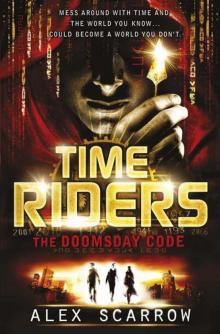 The Doomsday Code tr-3
The Doomsday Code tr-3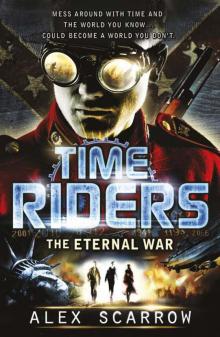 The Eternal War tr-4
The Eternal War tr-4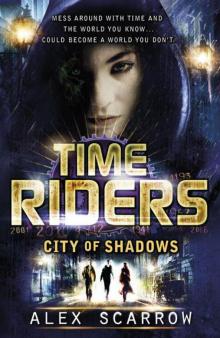 TimeRiders: City of Shadows (Book 6)
TimeRiders: City of Shadows (Book 6)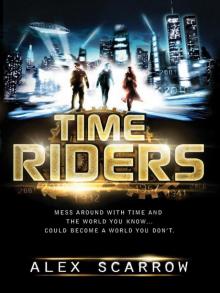 Time Riders tr-1
Time Riders tr-1 Afterlight
Afterlight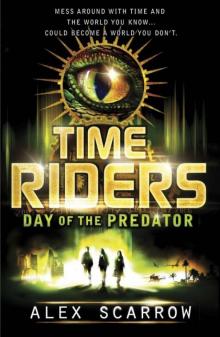 TimeRiders, Day of the Predator
TimeRiders, Day of the Predator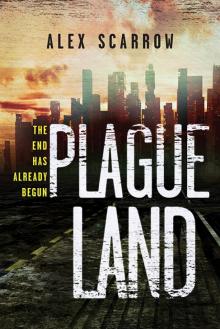 Plague Land Series, Book 1
Plague Land Series, Book 1